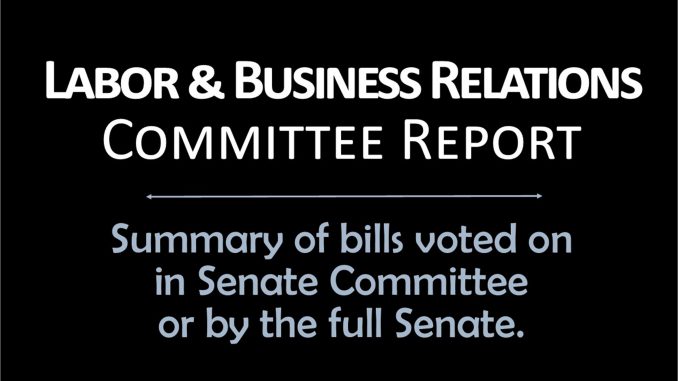
HF 2297—Boiler steam pressure vessel inspections;
HF 2321—Unemployment and Iowa Workforce Development;
HF 2383– Employer alcohol testing.
COMMITTEE ACTION:
HF 2297 changes the threshold for inspections of boilers and how boilers in dry lay-up are handled. Current law requires internal inspections of steel hot water boilers to be conducted once every six years and external inspections every year. Under the bill, steel hot water boilers will no longer be required to have an external inspection in the years internal inspections are conducted.
The bill changes the procedures regarding low pressure steam boilers in dry lay-up. Current law requires internal and external inspections every year while the boiler is operating. The bill states that if a steam boiler is in dry lay-up, an internal inspection will be conducted in lieu of an external inspection. An amendment was adopted in committee defines “dry lay-up.”
Iowa law requires inspections for boilers above 50 gallons and 50,000 British thermal units in places of public assembly. Under Iowa law, a place of “public assembly” means any of the following:
- A building or structure primarily used as a theater, motion picture theater, museum, arena, exhibition hall, school, college, dormitory, bowling alley, physical fitness center, family entertainment center, lodge hall, union hall, pool hall, casino, place of worship, funeral home, institution of health and custodial care, hospital, or child care or adult day services facility.
- A building or structure, a portion of which is primarily used for amusement, entertainment, or instruction.
- A building or structure owned by or leased to the state or any of its agencies or political subdivisions.
The bill increases the threshold for inspection to 120 gallons and 200,000 British Thermal Units, which would exempt at least 7,648 boilers from inspection. This is at odds with recommendations from the National Board of Boiler and Pressure Vessel Inspectors recommendations and Iowa Boiler and Pressure Vessel Board. The bill passed the Iowa House 57-40.
[3/13: 6-4 (No: Boulton, Bisignano, Dotzler, Taylor; Absent: Chapman)]
HF 2321 requires Iowa Workforce Development (IWD) to conduct criminal history checks for current or prospective employees and contractors with access to Federal tax information. The Federal government requires these checks for positions with access to IRS-provided tax information. Iowa Workforce Development will pay for the background checks.
Currently, pensions paid to employees upon separation from employment are applied to an unemployment insurance claim, depending on the percentage that was contributed by the employer. The bill changes the qualified retirement plan deductibility for unemployment benefits to apply only to 100 percent employer contribution plans.
The bill strikes language requiring employers to designate a period for the allocation of vacation pay to an employee who is laid off or separated from employment. The bill provides that vacation pay paid out to an employee will only be considered wages for the purposes of unemployment benefits for a maximum of five workdays.
The bill changes the language on the notice of unemployment appeal hearing, and adds clarity and a definite time frame. Under current law, the appeal hearing must not be scheduled before the seventh calendar day after the parties receive notice. The bill stipulates the notice for the appeal hearing be sent to all parties at least ten calendar days before the hearing date.
The bill permits Iowa Workforce development to require a nonprofit organization employing 15 or more full-time individuals that elects to become a reimbursable employer to file a bond a or security with IWD.
The bill changes the effect of unemployment benefits for past fraud or misrepresentation. Under the bill, those who’ve committed and been issued an appealable decision of fraud would not be eligible for future benefits until they repay their fraudulent overpayment. Currently, an individual could opt to have future benefits reduced.
The bill eliminates the minimum wage qualifying threshold in the definition of “employer” for unemployment insurance taxes. The current definition includes a minimum amount of wages an entity must pay in a calendar quarter ($1,500) to be considered an employer. That threshold is eliminated by the bill. The bill passed the Iowa House 96-0.
[3/13: Short form (No: Taylor; Absent: Chapman)]
